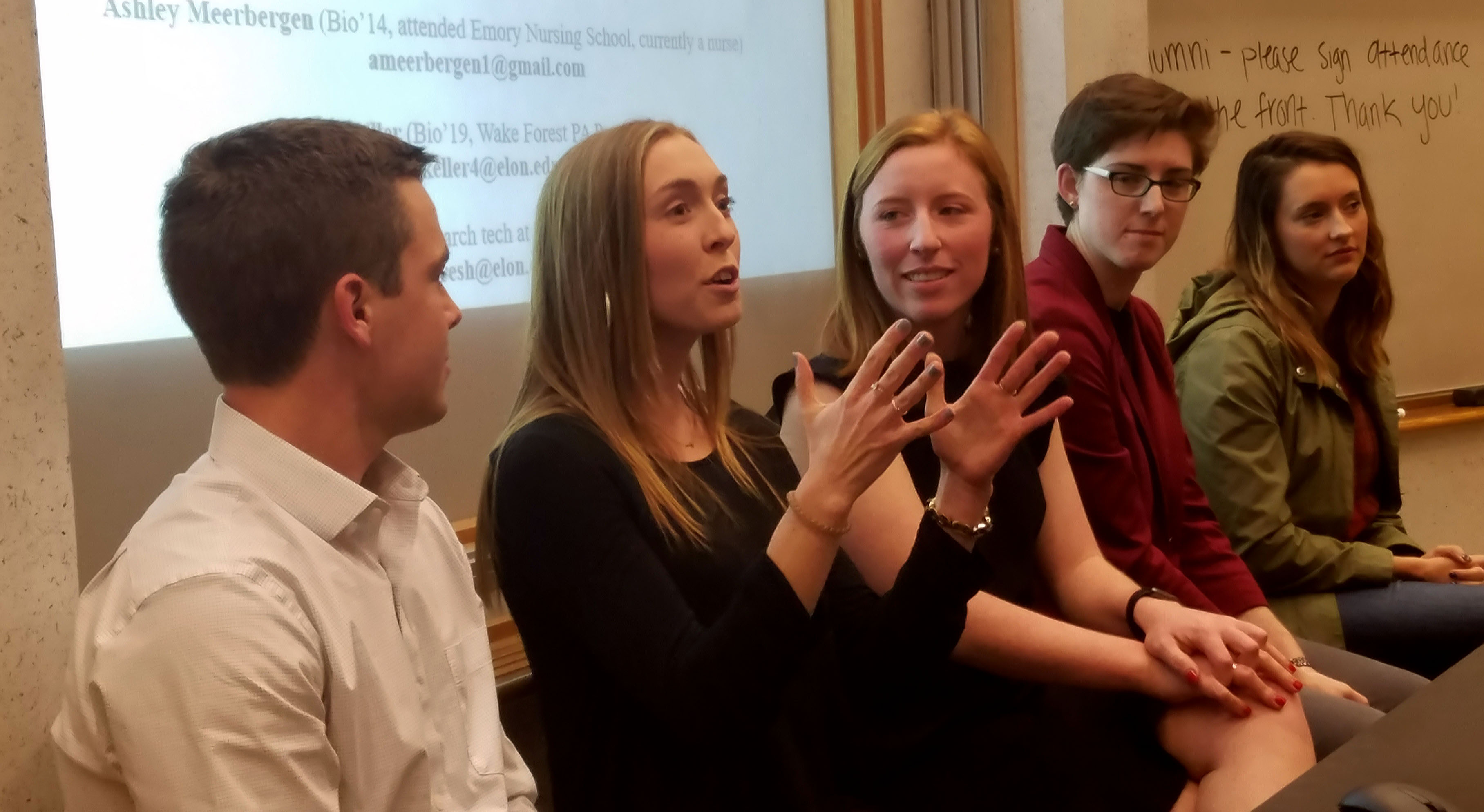The Biology Department's annual TriBeta alumni panel on Friday, Nov. 1, gave students the opportunity to have questions answered about classes, social life, finding a job and taking advantage of all Elon has to offer.
Time at Elon University is precious and filled with opportunities to grow and build strengths, and students should take advantage of as many as possible before graduation.
That was message five alumni of Elon’s Biology Department gave students Friday at the 11th annual TriBeta biological honors society alumni panel in McMichael Hall. The breadth of study and cultural offerings on campus, and connections beyond classrooms, help prepare undergraduates for life and leadership after Elon.
“This is the richest environment you could have to discover as many things as you want,” said Gabi Resh ’17, currently a researcher at Duke University School of Medicine. “Volunteer. Go to events and hear speakers. Be open-minded. Talk to as many people as you can.”
Other speakers on the panel were:
- Brian Dunn ’16, enrolled in graduate school at N.C. State University School of Business focusing on biotechnology;
- Emily Keller ’19, enrolled in the Wake Forest School of Medicine Physician Assistant Program;
- Ashley Meerbergen ’14, who earned a nursing degree at Emory University and is currently pursuing a masters in outcomes and systems management at UNC-Chapel Hill while working in the emergency department at UNC Hospitals; and
- Ellen Montgomery ’18, enrolled in the doctorate program in School of Pharmacology at UNC-Chapel Hill.
Here are pieces of advice they shared:
Explore career options by meeting as many people as you can.
“I volunteered at hospitals at home,” Keller said. “I walked the halls interviewing anyone I could find about health care and hospitals. That showed me that I loved what (physicians assistants) were doing. They are focused on patient care, and they’re the perfect mid-level provider.”
“You have to reach out to people,” Dunn said. “Set up informative interviews. Do research about the company on the website. Say: These are my interests, what do you do here, and where do my interests fit. Elon also has great alumni who will help you. Reach out!”
Take advantage of extracurricular opportunities.
“There are so many extracurriculars offered at Elon,” Montgomery said. “There’s a heavy course load and research and internships, but don’t forget about the leadership opportunities (at student organizations). Those are skills you will need in any job.”
“I didn’t take advantage of as many clubs and sports as I would have liked,” Resh said. “I saw a lot of cool things going on, but maybe there was a paper due or an exam to study for. Be more flexible with yourself. If there is a speaker coming that you’re interested in, go see that talk. Just do stuff.”
When in doubt, get a nursing degree.
“Go to nursing school, especially if you’re not sure about medicine,” Meerbergen said. “Nursing is fast. It gets you patient contact hours, gets you paid fast, and lays an amazing foundation for whatever you decide to do in medicine. Having a nursing degree in the medical field is always going to be a good thing.”
Take classes outside of your major.
“If something catches your eye, take it,” Keller said. “Don’t do something just for a minor. Take classes because you want to. Those classes will be meaningful for the rest of your life.”
“Take advantage of the wide breadth of classes that Elon offers,” said Dunn, who reflected on an art history course. “You will meet new people and learn new things. Just doing that teaches you a bunch of valuable skills.”
Do undergraduate research.
“It teaches you to be curious about everything. It teaches you how to ask questions all the time,” Keller said.
And if nothing else, it gives you a good story.
“I woke up at 4 a.m. every day for three years to study mockingbirds” with Professor Dave Gammon, Resh said. “It comes up in every interview: ‘So, mockingbirds, huh?’ It makes a good story, and it makes me memorable to them.”



